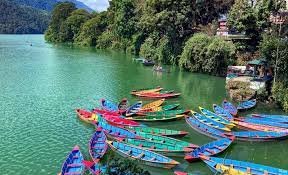Nepal Declares Pokhara as Its Tourism Capital
Nepal, renowned for its majestic landscapes and cultural richness, has recently declared Pokhara as its tourism capital, marking a significant milestone in its efforts to promote tourism. The announcement comes as a strategic move to amplify the country’s tourism potential and attract a larger influx of visitors, both domestic and international.
Introduction to Pokhara’s Charm
Pokhara, nestled in the lap of the Himalayas, has long been revered for its unparalleled natural beauty and serene ambiance. From the breathtaking views of the Annapurna range to the tranquil waters of Phewa Lake, Pokhara offers an enchanting retreat for travelers seeking solace amidst nature’s bounty.
Strategic Implications of the Declaration
The designation of Pokhara as Nepal’s tourism capital holds immense strategic significance. It not only underscores the city’s importance as a tourist destination but also signals Nepal’s commitment to revitalizing its tourism sector. By focusing on Pokhara, authorities aim to channel resources effectively to enhance infrastructure, accommodation facilities, and recreational offerings, thereby enriching the overall visitor experience.
Boosting Economic Growth
The decision is poised to catalyze economic growth, particularly in Pokhara and its surrounding regions. As tourism flourishes, it will stimulate various sectors, including hospitality, transportation, and retail, fostering job creation and entrepreneurial opportunities. Moreover, increased tourist footfall will contribute to the local economy through expenditures on accommodations, dining, and souvenirs.
Sustainable Development and Conservation
While pursuing tourism development, Nepal remains cognizant of the need for sustainable practices and environmental conservation. Efforts are underway to strike a balance between tourism promotion and preserving the ecological integrity of Pokhara’s natural landscapes. Initiatives such as eco-friendly tourism practices and community-based conservation projects are being prioritized to ensure the long-term viability of the region’s tourism sector.
Conclusion
In declaring Pokhara as its tourism capital, Nepal embarks on a transformative journey towards harnessing the full potential of its tourism industry. With its unrivaled beauty and cultural allure, Pokhara stands as a beacon of opportunity, beckoning travelers from around the globe to experience the magic of Nepal’s landscapes and hospitality.

Why this News is Important
Recognition of Pokhara’s Significance
Nepal’s declaration of Pokhara as its tourism capital is a pivotal development that underscores the city’s importance as a key tourist destination. This designation not only amplifies Pokhara’s allure but also reflects Nepal’s commitment to revitalizing its tourism sector.
Strategic Focus on Tourism Promotion
By concentrating efforts on Pokhara, Nepal aims to strategically promote tourism in a region endowed with natural splendor and cultural richness. This move highlights the government’s proactive stance towards leveraging the country’s tourism potential to drive economic growth and development.
Opportunities for Economic Stimulus
The decision holds significant implications for economic growth, particularly in Pokhara and its environs. Increased tourist inflow is expected to stimulate various sectors, creating employment opportunities and fostering entrepreneurship, thus contributing to broader economic prosperity.
Emphasis on Sustainable Development
Amidst the push for tourism promotion, Nepal remains committed to sustainable practices and environmental conservation. The declaration emphasizes the importance of balancing tourism development with ecological preservation, ensuring the long-term viability of Pokhara’s tourism industry.
Global Implications for Tourism
Nepal’s move to designate Pokhara as its tourism capital resonates beyond its borders, signaling to the global community its readiness to welcome visitors and showcase its cultural and natural heritage. This declaration has the potential to attract a diverse array of tourists, further enriching Nepal’s cultural tapestry and fostering international goodwill.
Historical Context
Pokhara: A Jewel in Nepal’s Crown
Pokhara, often hailed as the jewel of Nepal, boasts a rich historical and cultural heritage dating back centuries. Situated in the picturesque Gandaki Basin, Pokhara has served as a vital trading hub along ancient trans-Himalayan trade routes, connecting Nepal with Tibet and India.
Evolution as a Tourist Destination
Over the years, Pokhara has undergone a remarkable transformation from a quaint trading town to a thriving tourist destination. Its proximity to the Annapurna mountain range, including the iconic Machhapuchhre (Fishtail) peak, has drawn adventurers and nature enthusiasts from far and wide.
Government’s Tourism Initiatives
The government of Nepal has long recognized the tourism potential of Pokhara and has implemented various initiatives to promote the city as a premier tourist destination. Infrastructure development, including the construction of roads, airports, and accommodation facilities, has been prioritized to enhance the visitor experience.
Cultural Significance
Pokhara is not only renowned for its natural beauty but also for its cultural vibrancy. The city is home to diverse ethnic communities, each contributing to its unique tapestry of traditions, festivals, and cuisine. Visitors to Pokhara have the opportunity to immerse themselves in the rich cultural heritage of Nepal’s ethnic groups.
Environmental Conservation Efforts
In recent years, there has been a growing emphasis on environmental conservation and sustainable tourism practices in Pokhara. Community-based initiatives aimed at preserving the region’s biodiversity and promoting eco-friendly tourism have gained traction, ensuring that Pokhara’s natural landscapes remain pristine for generations to come.
5 Key Takeaways from “Pokhara Declared as Nepal’s Tourism Capital”
| Serial Number | Key Takeaway |
|---|---|
| 1. | Pokhara has been declared as Nepal’s tourism capital, signaling a strategic focus on promoting tourism in the region. |
| 2. | The designation aims to stimulate economic growth, create employment opportunities, and foster entrepreneurship in Pokhara and its surroundings. |
| 3. | Sustainable tourism practices and environmental conservation efforts are integral to Nepal’s tourism development strategy in Pokhara. |
| 4. | Pokhara’s historical and cultural significance, coupled with its natural beauty, positions it as a premier tourist destination in Nepal. |
| 5. | The declaration holds broader implications for Nepal’s tourism industry, signaling its readiness to welcome visitors and showcase its cultural and natural heritage on a global stage. |
Important FAQs for Students from this News
1. Q: Why was Pokhara declared as Nepal’s tourism capital?
A: Pokhara was declared as Nepal’s tourism capital to strategically promote tourism in the region, stimulate economic growth, and enhance the overall visitor experience.
2. Q: What are some of the key attractions in Pokhara?
A: Some of the key attractions in Pokhara include the majestic Annapurna mountain range, Phewa Lake, Davis Falls, and the World Peace Pagoda.
3. Q: How will the declaration of Pokhara as the tourism capital benefit the local economy?
A: The declaration is expected to benefit the local economy by stimulating various sectors such as hospitality, transportation, and retail, leading to job creation and fostering entrepreneurial opportunities.
4. Q: What measures are being taken to ensure sustainable tourism development in Pokhara?
A: Measures such as eco-friendly tourism practices and community-based conservation projects are being implemented to ensure sustainable tourism development in Pokhara while preserving its natural beauty.
5. Q: What is the historical significance of Pokhara?
A: Pokhara has a rich historical heritage as a vital trading hub along ancient trans-Himalayan trade routes, connecting Nepal with Tibet and India.
Some Important Current Affairs Links

















 Exciting News!
Exciting News!  Join Our Telegram Channel Now!
Join Our Telegram Channel Now!
 Join our Telegram channel for a thrilling adventure into the world of daily current affairs.
Join our Telegram channel for a thrilling adventure into the world of daily current affairs. 
 Don’t miss out on the latest updates and insights! Click to join now and be part of the knowledge revolution!
Don’t miss out on the latest updates and insights! Click to join now and be part of the knowledge revolution! 
